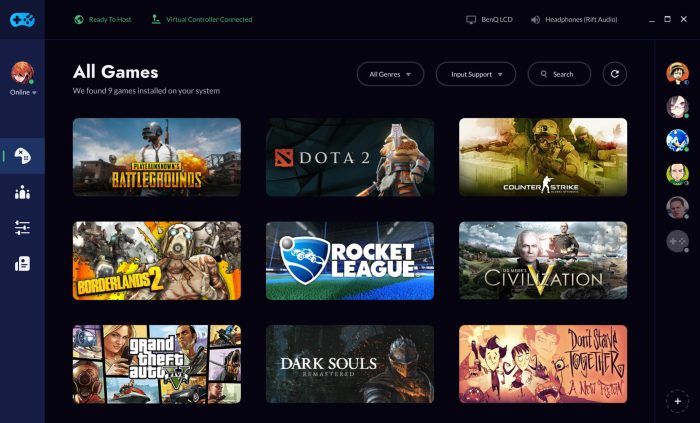
Step into the thrilling world of Game Streaming where gamers showcase their skills, interact with fans, and create a vibrant community around their favorite games. Get ready to dive into the action-packed realm of live gaming!
Game Streaming has revolutionized the way we experience gaming, offering a unique blend of entertainment and interactivity that keeps viewers on the edge of their seats.
Game Streaming

Game streaming is the act of broadcasting live gameplay footage over the internet for viewers to watch in real-time. This is typically done through platforms like Twitch, YouTube Gaming, or Mixer, where streamers can interact with their audience through chat while playing games.
Popularity of Game Streaming Platforms
- Twitch: One of the most popular game streaming platforms, known for its wide variety of content and interactive features like emotes and subscriptions.
- YouTube Gaming: A platform that allows gamers to live stream their gameplay and create content for their audience, often integrated with the main YouTube platform.
Live Game Streaming vs. Pre-recorded Videos
- Live Game Streaming: Offers real-time interaction between streamers and viewers, creating a sense of community and immediacy.
- Pre-recorded Videos: Allows for more polished and edited content, offering a different viewing experience compared to live streams.
Benefits of Game Streaming
- For Streamers: Provides a platform to showcase gameplay skills, build a community, and even earn money through donations, subscriptions, and sponsorships.
- For Viewers: Offers entertainment, a sense of connection with streamers, and the opportunity to learn new strategies or techniques by watching skilled players.
Online Gaming
Online gaming has experienced significant growth over the years, reshaping the gaming industry and how gamers interact with each other. The ability to connect with players from around the world in real-time has revolutionized the gaming experience, leading to the rise of multiplayer online games.
Evolution of Multiplayer Online Games
- Multiplayer online games have evolved from simple text-based interfaces to complex virtual worlds with stunning graphics and immersive gameplay.
- These games allow players to collaborate or compete with each other in real-time, creating a dynamic and engaging experience.
- The introduction of online multiplayer capabilities has transformed traditional single-player games into social experiences, attracting a wider audience of players.
Genres of Online Games
- MMORPGs (Massively Multiplayer Online Role-Playing Games): These games feature vast open worlds, character customization, and cooperative gameplay, where players embark on adventures and complete quests together.
- First-Person Shooters (FPS): FPS games emphasize fast-paced action and competitive gameplay, where players engage in combat scenarios against each other or AI opponents.
- MOBAs (Multiplayer Online Battle Arenas): MOBAs focus on team-based strategy and coordination, where players control unique characters with distinct abilities to achieve victory.
Role of Online Gaming Communities
- Online gaming communities play a vital role in shaping the gaming experience by providing forums, social platforms, and in-game chat features for players to connect and communicate.
- These communities foster a sense of belonging and camaraderie among players, facilitating the exchange of strategies, tips, and experiences.
- By engaging with online gaming communities, players can enhance their skills, build friendships, and participate in organized events and competitions.
Gaming Communities
Gaming communities play a crucial role in the gaming ecosystem by bringing together players with common interests, creating a sense of belonging, and fostering collaboration and competition. These communities can be online or offline, providing a platform for gamers to connect, share experiences, and participate in various activities.
Importance of Gaming Communities
- Support and Friendship: Gaming communities offer support and friendship to players, especially important in online gaming where individuals may feel isolated.
- Skill Development: By interacting with other gamers, players can learn new strategies, improve their skills, and enhance their gameplay.
- Events and Tournaments: Gaming communities organize events, competitions, and tournaments, providing opportunities for players to showcase their abilities and win prizes.
Popular Gaming Communities and Activities
- Reddit’s r/gaming: A popular online community where gamers discuss news, share memes, and engage in debates about the gaming industry.
- Discord Servers: Many gaming communities have dedicated Discord servers where players can voice chat, organize gaming sessions, and build friendships.
- Esports Organizations: Esports teams and organizations like Team Liquid, Cloud9, and FaZe Clan have large followings and host tournaments for their fans.
Contribution to Gaming Culture
- Celebrating Diversity: Gaming communities embrace players from different backgrounds, fostering inclusivity and diversity within the gaming culture.
- Creative Expression: Gamers in communities often create fan art, fan fiction, and other forms of creative content inspired by their favorite games, contributing to the overall gaming culture.
- Critical Discourse: Gaming communities engage in critical discussions about game design, industry practices, and social issues, shaping the narrative around gaming culture.
Role of Forums, Social Media, and Discord
- Forums: Platforms like Reddit, GameFAQs, and Steam forums provide spaces for gamers to ask questions, share tips, and engage in discussions about their favorite games.
- Social Media: Twitter, Facebook, and Instagram allow gaming communities to connect, share content, and stay updated on the latest gaming news and trends.
- Discord: Discord has become a popular platform for gaming communities to communicate in real-time, organize events, and build strong friendships through voice and text chat.
Video Game Reviews

Video game reviews play a crucial role in helping players make informed decisions before purchasing or playing a game. They provide valuable insights into the gameplay experience, graphics, storyline, mechanics, and overall quality of a game.
Criteria for Reviewing Video Games and Assigning Ratings
- Gameplay: This includes the mechanics, controls, level design, and overall enjoyment factor.
- Graphics and Visuals: The quality of graphics, art style, animations, and visual effects.
- Storyline and Narrative: The plot, character development, dialogue, and overall storytelling elements.
- Sound and Music: The quality of sound effects, voice acting, soundtrack, and how they enhance the gaming experience.
- Replay Value: The potential for replayability, additional content, side quests, and multiplayer features.
Professional Game Reviews vs. User-Generated Reviews
Professional game reviews are typically written by experienced reviewers or journalists who evaluate games based on set criteria and standards. They often have access to early copies of games and provide in-depth analysis. On the other hand, user-generated reviews come from gamers who have played the game and share their personal opinions and experiences. While both types of reviews are valuable, professional reviews tend to be more objective and detailed, while user reviews offer a more personal perspective.
Impact of Video Game Reviews on Game Success
Video game reviews can significantly impact the success of a game. Positive reviews can increase sales, attract more players, and help build a strong reputation for the game and its developers. Conversely, negative reviews can deter players from purchasing or playing a game, leading to poor sales and potentially damaging the reputation of the game. Developers often take into account reviews and feedback to improve future releases and address any issues raised by reviewers.
Console Games
Console gaming has been a cornerstone of the video game industry for decades, providing millions of players worldwide with immersive gaming experiences right in their living rooms. Let’s take a closer look at the history, evolution, and future of console gaming.
History of Console Gaming
Console gaming traces its roots back to the 1970s with the release of the Magnavox Odyssey, considered the first commercial home video game console. Over the years, we’ve seen the rise of iconic consoles like the Atari 2600, Nintendo Entertainment System (NES), Sega Genesis, PlayStation, Xbox, and more. Each generation of consoles brought technological advancements and innovative gameplay experiences to players around the globe.
Evolution of Console Gaming
The evolution of console gaming has been marked by significant improvements in hardware capabilities, graphics, sound quality, and gameplay mechanics. From 2D side-scrolling platformers to immersive open-world adventures in stunning 4K resolution, consoles have come a long way in delivering cutting-edge gaming experiences to players of all ages.
Comparison of Gaming Consoles
When comparing different gaming consoles, factors like hardware specifications, exclusive titles, and performance play a crucial role in determining the overall gaming experience. From the powerful hardware of the PlayStation 5 and Xbox Series X to the innovative features of the Nintendo Switch, each console offers a unique set of strengths and exclusive games that cater to different gaming preferences.
Rivalry Among Console Manufacturers
The rivalry between major console manufacturers like Sony, Microsoft, and Nintendo has fueled innovation and competition in the gaming industry. Each company strives to outdo the other in terms of hardware capabilities, exclusive titles, online services, and overall gaming experience, leading to a diverse range of options for players to choose from.
Future of Console Gaming
As gaming technology continues to advance, the future of console gaming is poised to embrace digital distribution, cloud gaming, and streaming services. With the advent of platforms like Xbox Game Pass, PlayStation Now, and cloud gaming services, consoles are evolving to offer more flexible and accessible gaming experiences to players, paving the way for a more interconnected and immersive gaming landscape.
Final Summary
In conclusion, Game Streaming has transformed the gaming landscape, providing a platform for gamers to connect, entertain, and inspire audiences worldwide. Whether you’re a seasoned gamer or a curious newbie, the world of Game Streaming welcomes you with open arms.
Quick FAQs
How does game streaming work?
Game streaming involves broadcasting gameplay in real-time over the internet, allowing viewers to watch and interact with the streamer.
What are the benefits of game streaming?
Game streaming provides a platform for gamers to showcase their skills, build a community, and engage with fans in real-time.
What is the difference between live game streaming and pre-recorded videos?
Live game streaming involves broadcasting gameplay as it happens, while pre-recorded videos are edited and uploaded later.





